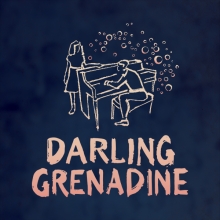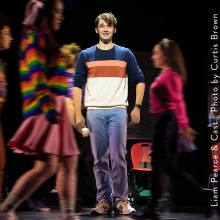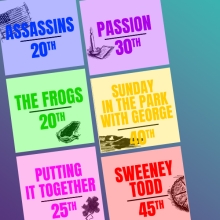
Full Synopsis
Act One
The show opens in a provincial German town in the late nineteenth century. Teenaged Wendla Bergman looks into a mirror, gently exploring her maturing body. She wonders about her changing feelings and wishes her mother would teach her what these changes mean ("Mama Who Bore Me"). Frau Bergman, Wendla's mother, enters and chastises her for wearing a childish dress – she must dress more properly because she is already in bloom. Wendla doesn't understand. Frau Bergman has good news: Wendla's sister has been visited by the stork and now has another baby girl. Wendla asks her mother to tell her where babies actually come from, as she knows the stork story is for children. Her mother tries to tell her but is too embarrassed to go into detail. Frustrated, Wendla and her friends lament their ignorance of these matters ("Mama Who Bore Me – Reprise").
At the boys' school, Herr Sonnenstich makes his pupils recite Latin. Mortiz Stiefel has fallen asleep in class, and Herr Sonnenstich embarrasses him by making him recite when he clearly doesn't know the text. His friend, Melchior Gabor, tries to come to his rescue by questioning the teacher's interpretation of the text. Herr Sonnenstich will have none of Melchior's outside-the-box thinking. In his mind, Melchior pushes back against the restrictive teachings of his elders ("All That's Known"). Moritz thanks Melchior and confesses the reason he hasn't been sleeping: he is troubled by mortifying dreams – he envisions a pair of legs in blue stockings. Melchior confirms that everyone in their class has similar dreams, including Georg Zirschnitz, dreaming about his piano teacher. The boys rock out, sharing their various fantasies ("The Bitch of Living").
After class, Melchior promises to enlighten Moritz about his dreams. Meanwhile, the Headmaster and one of the teachers worry that Moritz is polluting Melchior, their brightest student, by association. They take comfort in knowing that Mortiz will probably not pass to the upper grade. Later that afternoon, Wendla and a group of girls walk through the woods, discussing their secret crushes. They are all in love with Melchior. Everyone, girls and boys alike, is hung up on the new feelings that are taking them over ("My Junk").
At the Gabor house, Moritz tries to process the drawings that Melchior gave him that describe male and female relations. Melchior's mother interrupts them and, although she is surprised to see her son reading Faust, she trusts him to decide for himself what is good for him. Moritz is overcome with anxiety about what he has learned as the boys and girls yearn with anticipation ("Touch Me").
Melchior and Wendla discover each other in the woods. They sit together beneath an oak tree, secretly longing for each other ("The Word of Your Body").
Back at school, Moritz has snuck into the headmaster's office and discovers that he has passed his midterm exams. He is ecstatic. The teachers, on the other hand, are concerned that it will reflect badly on them if Mortiz advances to the next grade. Herr Knochenbruch reminds Fraulein Knuppeldick that he will be grading the final exams, and she is reassured that their school's reputation will be safe.
Walking home again, the girls discover that Martha's father beats her with a belt. They urge her to tell someone, but she is concerned that she will be thrown out of the house, like their friend, Ilse. The girls are troubled by the situation as Martha reveals to the audience the part of her father's abuse that she cannot tell her friends; she is joined by Ilse ("The Dark I Know Well").
Back in the woods, Melchior writes in his journal. Wendla finds him. She tells him about the situation with Martha and says that she cannot imagine ever being hit. She picks up a stick and asks him to beat her with it. At first, Melchior refuses, but then, after a moment of gently tapping her, he is overcome and hits her very hard and yells at her ("The Word of Your Body – Reprise 1").
Meanwhile, at Moritz's house, his father threatens him if he does not advance to the upper grade. Moritz writes a letter to Frau Gabor, asking for money so that he can escape to America because he has failed his exams and not been promoted. She refuses him the money, but offers to talk to his parents on his behalf. This is not enough, and Moritz experiences a nervous breakdown ("And Then There Were None"). He exits with a gun in hand.
Melchior is very disturbed by what has happened with Wendla in the woods ("The Mirror-Blue Night"). With his journal in her hand, she finds him in a hayloft and confesses to having read some of it. She apologizes to him for making him hit her, but he takes responsibility for what happened. They get close to each other, and he kisses her. As he starts taking it further, Wendla is hesitant but Melchior insists that they ought to be allowed to love and feel something. As he begins to touch her, she tells him to wait, but he reassures her that it is just him, and they come together ("I Believe").
Act Two
At church, Father Kaulbach sermonizes about children betraying their parents while, in the hayloft, Melchior asks Wendla if she is okay; she is lost in what just happened, but she thinks that she is okay ("The Guilty Ones").
Moritz stands alone by a river. He is at the end of his rope ("Don't Do Sadness"). Ilse stumbles upon him and reminds him of their time together as children, playing with Wendla and Melchior ("Blue Wind"). Moritz is distracted and upset; Ilse asks him to spend time with her, but he refuses – he has too much schoolwork ("Don't Do Sadness / Blue Wind"). She asks him to walk her home, but he refuses. She chastises him for abandoning her and leaves. He regrets not having gone with her, but then makes his decision and cocks the gun.
Later, at Moritz's funeral, Melchior indicts the adults who betrayed Moritz by pressuring him so much, while mourning the loss of his friend ("Left Behind"). At school, Melchior gets called to the headmaster's office. They have found his drawings. They blame Moritz's actions on the drawings and Melchior. They ask Melchior if he, in fact, did do the illustrations; he knows that he's stuck ("Totally Fucked").
In a vineyard at sunset, Hanschen and Ernst roll in the grass. Hanschen observes that there are three ways a man can go: let the status quo defeat him, like Moritz; rock the boat, like Melchior; or bide his time and let the system work for him, like Hanschen does. Ernst confesses his deep love for Hanschen as they make love ("The Word of Your Body – Reprise 2").
Melchior writes to Wendla, asking to return with her to their paradise. Simultaneously, Wendla sees a doctor who reveals to Frau Bergman that Wendla is pregnant. Wendla is shocked and she lashes out at her mother for not telling her everything. She gives her mother Melchior's letter. Melchior's parents discuss what to do about him. Frau Gabor believes it is too harsh to send him to a reformatory. However, when Herr Gabor shows her the letter that he wrote to Wendla, admitting that he knew what he was doing, she acquiesces ("Whispering").
At the reformatory, the other boys harass Melchior. They steal a letter that Wendla has written to him, and reveal to him that Wendla is pregnant. Meanwhile, Frau Bergman takes Wendla to a secret abortionist. Melchior escapes the reformatory and writes to Ilse, who shares the letter with the other girls. He plans to go to the graveyard at midnight to wait for her; the girls realize that he doesn't know what has happened to Wendla.
When Melchior gets to the cemetery, he finds Wendla's grave. He is bereft and contemplates suicide. The ghosts of Moritz and Wendla appear to comfort him and urge him forward into the world, holding on to the memory of what happened to his friends ("Those You've Known"). He promises never to let them go. Ilse then stands alone. She reflects on the events that have happened; she is joined by the rest of the cast as they look towards a time when all shall know the wonder of purple summer ("The Song of Purple Summer").
Show History
Inspiration
Spring Awakening, a rock musical with music by Duncan Sheik and book and lyrics by Steven Sater, is based on the play of the same name, written by Frank Wedekind in 1891. The play was extremely controversial at the time of its release for its depiction of such topics as abortion, rape, child abuse and suicide, and it was banned from Germany for some time. Sheik and Sater desired to adapt Wedekind's ideas of teenage rebellion and sexual discovery to the stage, using an alternative rock score as the background.
Before premiering Off-Broadway, the musical's plot resembled the plot of the original play much more closely. Sater and Sheik originally wrote that Melchior actually rapes Wendla at the end of the song, "I Believe," mirroring the action in the play, but decided against it to depict the scene as more loving between the two characters. Among the other changes were the cutting of a vast array of songs; while some of those cut were just reprises of already written songs, others had the same themes as other numbers and were eliminated for time.
Productions
Spring Awakening started in flux, with a seven-year period of workshops, concerts, and numerous rewrites. Among the notable productions in this period include workshops at the La Jolla Playhouse in San Diego and the Roundabout Theatre Company in New York, as well as a concert at Lincoln Center. The musical premiered Off-Broadway at the Atlantic Theatre Company with a run from May 19, to August 5, 2006. Its success prompted an opening on Broadway at the Eugene O'Neill Theatre on December 10, 2006, directed by Michael Mayer, choreographed by Bill T. Jones, and running until January 18, 2009, with 859 performances. On August 15, 2008, the first national tour began in San Diego; it ended on May 23, 2010, but another non-union tour ran soon after from October 14, 2010, to May 15, 2011. The original London production opened January 23, 2009, at the Lyric Hammersmith before transferring to the Novello Theatre and closing on May 30, 2009.
However, the London production was not the European premiere of Spring Awakening. That title goes to a production at the Varmlandsoperan in Karlstad, Sweden, on August 30, 2008, utilizing completely Swedish text. Throughout 2009 and 2010, the musical premiered in a multitude of countries and languages, including Finland, Hungary, Japan, Argentina and Australia. 2011 saw the premieres of both an Australian tour and a UK tour. More recently, Spring Awakening premiered in 2013 in New Zealand and Portugal, and faced a production by the University of Birmingham that completely reinterpreted the script.
Cultural Influence
- The U.S. television series, "90210," and Australian soap opera, "Home and Away," incorporated Spring Awakening into their plots.
- Apple's Keynote, a presentation application, uses the lyrics of the song, "The Bitch of Living," on its icon.
- The guitar that composer, Duncan Sheik, used to compose songs for Spring Awakening was included in the 2008 exhibition, "Writing to Character: Songwriters & the Tony Awards" at the New York Public Library for the Performing Arts.
- Duncan Sheik and Steven Sater's use of alternative rock and folk music encouraged other composers to use these styles in their work. Among such future musicals that utilized the musical style as well are The Toxic Avenger and Once.
- Spring Awakening's use of younger talent served as a budding opportunity for talented teenagers to find their way onto Broadway, virtually unprecedented in an industry dominated with parts for older males and females.
- Spring Awakening's handling of the idea of sex in its many forms was the first in its kind for Broadway, typically known for its rather sterile handling of romance.
Trivia
- Celebrities that have starred in Spring Awakening include: Lea Michele (Wendla), Jonathan Groff (Melchior), John Gallagher, Jr. (Moritz), Hunter Parrish (Melchior), Christine Estabrook (Adult Women), Stephen Spinella (Adult Men), Jenna Ushkowitz (Ilse), Kate Burton (Adult Women), Blake Bashoff (Moritz), Iwan Rheon (Moritz), Emily Kinney (Anna), Lauren Pritchard (Ilse), Skylar Astin (Georg), Kyle Riabko (Melchior), Phoebe Strole (Anna), Jonathan B. Wright (Hanschen), Steffi DiDomenicantonio (Ilse), Henry Stram (Adult Men), Andy Mientus (Hanschen), Aneurin Barnard (Melchior), Drew Tyler Bell (Hanschen), Alexandra Socha (Wendla), Gideon Glick (Ernst), Remy Zaken (Thea), Jennifer Damiano (Ensemble), Krysta Rodriguez (Ensemble), Joo Won (Melchior), Kim Mu-yeol (Melchior) and Jo Jung-suk (Moritz).
Critical Reaction
"Beautiful, messy, exhilarating, awkward, vital.... [Duncan Sheik] manages to deliver lovely, graceful pop melodies that work in a theatrical context that is, to propel a story and elucidate its characters."
– USA Today
"This brave new musical, haunting and electrifying by turns, restores the mystery, the thrill and quite a bit of the terror to that shattering transformation that stirs in all our souls sometime around the age of 13, well before most of us have the intellectual apparatus in place to analyze its impact. ...Mr. Sater, who wrote the book and lyrics, remains faithful to the play's awareness that the discovery of sex can carry in its heady wake both salvation and destruction, particularly when it is coupled with ignorance. Mr. Sheik's music, spare in its simple orchestrations, lush in the lapping reach of its seductive choruses, embodies the shadowy air of longing that infuses the show, the excitement shading into fear, the joy that comes with a chaser of despair."
– The New York Times
"Captures the dangerous anxiety of youth standing on the precipice of adulthood with transfixing honesty. ...Sater's book and lyrics seem to capture from within the uniquely teenage feeling that every emotion is the most tempestuous, frightening, passionate or exciting one ever experienced. Factor in Sheik's melodic alt-rock score, which shifts easefully between dreamy and driving modes... and you have a show that bristles with rawness, vitality and urgency. ...What makes the musical so distinctive is its audacious balancing act between period drama and contemporary edge."
– Variety
"Great news for theatergoers who have craved a new musical with attitude, youthful exuberance and a fresh, gutsy sound: Spring Awakening... is what they've been seeking."
– New York Daily News
"What [Sheik and Sater] have done here is upend traditional musical theater. They separate story from song, rigidly dividing the saga of these troubled teens as they confront their budding sexuality in a world that wants to keep it hidden. Propriety and appearances are what count, after all."
– The Associated Press
Connect
Billing
- Book and Lyrics by
- Music by
Based on the play by Frank Wedekind
Requirements
|
Book & Lyrics by
STEVEN SATER
(50%)
|
Music by
DUNCAN SHEIK
(50%)
|
|
Orchestrations
Duncan Sheik
|
Vocal Arrangements
AnnMarie Milazzo
|
String Orchestrations
Simon Hale
|
Video Warning
In accordance with the Performance License, you MUST include the following warning in all programs and in a pre-show announcement:ANY VIDEO AND/OR AUDIO RECORDING OF THIS PRODUCTION IS STRICTLY PROHIBITED.
Included Materials
| Item | Quantity Included |
|---|---|
| DIGITAL ORCHESTRATION SUPPLEMENT | 1 |
| LIBRETTO/VOCAL BOOK | 20 |
| PIANO CONDUCTOR'S SCORE | 2 |
Production Resources
| Resource |
|---|
| HOW DOES THE SHOW GO ON-10/CS |
| HOW DOES THE SHOW GO ON? |
| KEYBOARD PATCH SOLUTIONS |
| KEYBOARDTEK |
| LOGO PACK |
| LOGO PACK DIGITAL |
| LOGO TEES SIX-PACK ADULT LARGE |
| LOGO TEES SIX-PACK ADULT MEDIUM |
| LOGO TEES SIX-PACK ADULT SMALL |
| LOGO TEES SIX-PACK ADULT X-LARGE |
| LOGO TEES SIX-PACK ADULT XX-LARGE |
| LOGO TEES SIX-PACK CHILD LARGE |
| LOGO TEES SIX-PACK CHILD MEDIUM |
| LOGO TEES SIX-PACK CHILD SMALL |
| PERFORMANCE ACCOMPANIMENT RECORDING |
| PRODUCTIONPRO-DIGITAL SCRIPT/SCORE |
| REFERENCE RECORDING |
| REHEARSAL ACCOMPANIMENT RECORDING |
| SCENE PARTNER |
| STAGE MANAGER SCRIPT |
| STAGE WRITE APPLICATION |
| TRANSPOSITIONS-ON-DEMAND |
| VIRTUAL STAGE MANAGER |
STANDARD ORCHESTRATION
| Instrumentation | Doubling |
|---|---|
| BASS | ACOUSTIC BASS , ELECTRIC BASS |
| CELLO | |
| DRUMS | DJEMBE , DRUM SET , GLOCKENSPIEL , SHAKER , TAMBOURINE |
| GUITAR | |
| PIANO | |
| PIANO 2 | |
| VIOLA | |
| VIOLIN | ACOUSTIC GUITAR , ELECTRIC GUITAR , VIOLIN |




